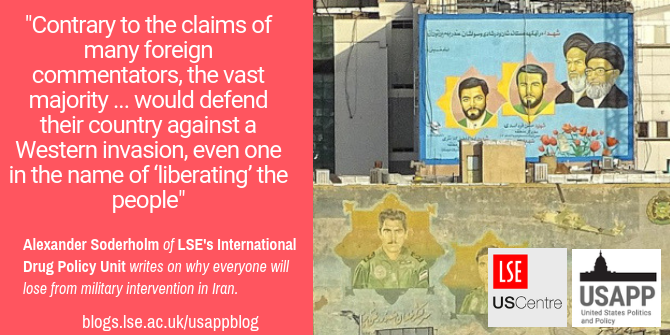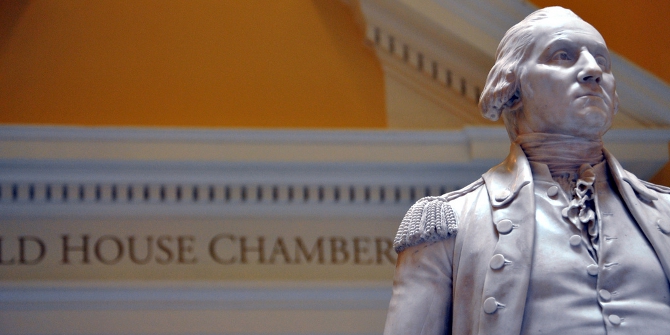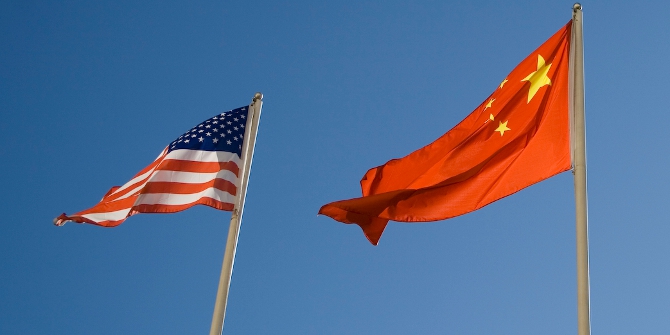 Recent weeks have seen rising tensions between Iran and the US and UK, following the international effort to salvage the Joint Comprehensive Plan of Action – the Iran nuclear deal – in the face of renewed US sanctions and difficulties in trading with the European Union. Alexander Soderholm writes that despite the escalation between both sides, the aftermath of military interventions in Iraq and Afghanistan have shown that similar action against Iran would be a grave mistake.
Recent weeks have seen rising tensions between Iran and the US and UK, following the international effort to salvage the Joint Comprehensive Plan of Action – the Iran nuclear deal – in the face of renewed US sanctions and difficulties in trading with the European Union. Alexander Soderholm writes that despite the escalation between both sides, the aftermath of military interventions in Iraq and Afghanistan have shown that similar action against Iran would be a grave mistake.
The 15th of October 2015 was an unusually warm day. On my way home from the offices of the United Nations Office on Drugs and Crime in northern Tehran, I noticed that the streets around Vanak Square were unusually busy and bustling. Cars were honking, music playing, and people were getting out of their cars to dance in the streets (an activity that is illegal and rarely seen in public). This was the day the Joint Comprehensive Plan of Action (JCPOA), better known as the ‘Iran nuclear deal’, was formally adopted by Iran and the P5+1. The sense of optimism, hope for a better future, and the promise of an Iran integrated into the global economy permeated the atmosphere.
At the time, pessimists and hardliners steadfastly proclaimed that the nuclear deal did not matter, that the West would continue to isolate and put pressure on Iran, and ultimately take advantage of the country’s ‘goodwill’. Nevertheless, that same day the European Council adopted the legal acts preparing for the lifting of all nuclear-related economic and financial sanctions. The pessimism of some was not powerful enough to contain the exuberance of the day. For the first moment in a long time, many Iranians felt hopeful for change.
Almost three years on many of the pessimists were proven right. In May 2018, President Trump announced that the US government would withdraw from the JCPOA, a key election promise and his first landmark foreign policy decision as President. The strong opposition of the European Union (EU) and other signatories were ignored, much to the dismay of Iranian reformists and moderates. On a practical level, Iran was living up to its part of the deal. This has consistently been stated by the International Energy and Atomic Agency of the United Nations, tasked with the monitoring of Iranian compliance with the JCPOA.
The move bolstered the position of the hardliners in Iran and their anti-Western rhetoric, whilst achieving the very same effect for hardliners in the West who had always thought the JCPOA was lending justification and cover to the activities of the Iranian government. Simultaneously, the Iranian currency was pushed to record lows, the annual inflation rate quadrupled and foreign investors, already wary of trading with Iran, were finally scared away.
In response to mounting pressures, in May 2019 the Iranian government gave an ultimatum to the signatories of the deal. It announced a 60-day deadline for the signatories to salvage it, by facilitating and protecting Iranian oil exports and trade. Part of Tehran’s frustration with the EU related to the Union’s delay in establishing a special trading mechanism to provide European businesses with safeguards against renewed US sanctions. Since May, Iran has shown that it was serious in its threat by increasing its stockpiles of uranium, including breaching other commitments under the deal. Having been pushed into a corner, facing a new era of unprecedented economic hardship, some have argued that Tehran has had few options but to break commitments of the JCPOA. As stated by Gérard Araud and Ali Vaez in Foreign Policy on July 2nd, breaking the commitments is ‘a calculated effort to get European leaders to reinforce the nuclear deal and halt the drift toward war’.
A Rapid Escalation of Tensions
Over the last few months, worryingly, the case for military intervention in Iran has received increasing attention – exacerbated by several maritime incidents in the Persian Gulf.
This renewed push was sparked by the sabotage of four oil tankers in the Persian Gulf, allegedly by Iranian intelligence operatives. Moreover, the landmark downing of a US surveillance drone in the Gulf on 20 June by the IRGC further escalated the situation – with Tehran claiming the drone was flying over Iranian territorial waters (which has been denied by US intelligence). During a campaign speech in Scotland in June, the UK’s then Foreign Secretary, Jeremy Hunt, stated that the UK would consider joining the US in military action against Iran.

“USS Kearsarge (LHD 3) transits the Strait of Hormuz.” by Official U.S. Navy Page is licensed under CC BY 2.0
Since then, the situation has continued to spiral as the UK Royal Navy seized the oil tanker Grace 1 off the coast of Gibraltar, a formerly Panama-registered vessel carrying Iranian oil to their allies in Syria (in violation of EU sanctions). This prompted the Iranian foreign ministry spokesman, Abbas Mousavi, to label the action a ‘form of piracy’, calling for the release of the tanker. In addition, Mohsen Rezaei, of the Expediency Discernment Council advising Supreme Leader Khamenei, stated that ‘if Britain does not release the Iranian oil tanker, it is the (Iranian) authorities’ duty to seize a British oil tanker’.
A few days later, several speedboats tried to block the path of a British tanker in the Gulf, prompting the UK’s HMS Montrose to issue verbal warnings and aim their armaments on the aggressors, at which point these turned back. In an attempt to de-escalate, Jeremy Hunt stated that the tanker carrying Iranian oil would be returned should Tehran provide guarantees that the oil would not go to Syria.
Rather than walking down the path of de-escalation, on 19 July the IRGC detained the UK-flagged Stena Impero and its 23 crew members. In response, the UK sent another warship to the Gulf, to protect the safe passage of tankers and other maritime vessels in the Strait of Hormuz.
This severe escalation of tensions seriously complicates the survival of the nuclear deal, casting doubts over the ability of the EU to continue to lobby for the JCPOA in the face of strong pressures from the US and the violations of the deal by Iran, including their recent actions in the Gulf. A meeting between the Iranian government and the UAE on 31 July, to discuss maritime security in the Gulf (the first such meeting between the two nations since 2013), sparked hopes of a de-escalation between the Arab states of the Persian Gulf (notably Saudi Arabia and the UAE) and the Islamic Republic of Iran. Time will tell if these nascent discussions are successful in bringing these long-standing adversaries closer.
Everyone (but the hardliners) will Lose from Military Intervention
Military strategists and policy makers should have learned from the gross failures in Afghanistan and Iraq long ago. Yet again, military intervention in an already conflict-affected and fragmented part of the world is being considered as a way to ‘contain’ and ultimately depose the Iranian regime.
Almost two decades have passed since the international intervention in Afghanistan began, with no end to hostilities in sight (except for peace talks underway between the US Representative to Afghanistan, Zalmay Khalilzad, and the Taliban – any outcome of which are unclear that the Afghan government will honour or subscribe to). Moreover, the dismantling of the Iraqi state a few years later led to the formation of numerous extremist groups (playing a key role in the emergence of ISIS), with violent conflict spreading across and beyond the region. The conflicts in Afghanistan and Iraq has led to the loss of hundreds of thousands of lives, the destruction of those countries’ economies, entrenched humanitarian disasters, and the violation of human rights on a mass scale. Based on regional fragility and ongoing conflicts, military intervention in Iran would have disastrous consequences for the region and the world. This would not only have an effect on the fragile reconstruction process in Iraq and the peace process in Afghanistan, but also on those conflict-affected states where Iran has established proxy-influence, notably in Syria and Yemen, where the Islamic Republic has capitalised on power vacuums and built a bulwark against foreign intervention.

Credit: Bjørn Christian Tørrissen [CC BY-SA 4.0]
From a realist and a military perspective, the Islamic Republic has been preparing for foreign intervention since its inception in 1979. The bitter experience of the drawn-out conflict with Iraq in the 1980s is still kept alive across Iran, with murals and signs in all major cities through to rural villages depicting the swathes of young martyrs who defended their country in the face of foreign oppression. Tehran has not remained idle preparing for future confrontations, developing military capacity in a number of branches, such as the Iranian Revolutionary Guards Corps, but also the people’s militia (Basij), and numerous other cells that would be operationalised in case of conflict. Whereas Baghdad fell in 3 weeks, it is clear that the Iranian revolutionaries would seek to stick it out until the bitter end – a catastrophe in the waiting for all sides of any potential conflict.
Over the course of my own research in Iran, I have met with a range of people – from those who can be classed as government ‘hardliners’, moderates and reformists, to the many staunch critics of the Islamic Republic. What binds these people together is the love they share for their country, and, contrary to the claims of many foreign commentators, the vast majority of them would defend their country against a Western invasion, even one in the name of ‘liberating’ the people. In conversations with some of the staunchest regime critics, from young to old, this has time and again been told to me in a variety of contexts. The destruction of two of their neighbouring states has made Iranians wary of any military action, with a heavy scepticism of the intentions behind a US military intervention in particular. As stated by the BBC reporter Martin Patience during his visit to Tehran in July 2019, ‘It’s the hardliners that run this country, but when Iran is confronted by America, both conservatives and liberals will put their country first.’
The mood in Tehran is drastically different from the day when the nuclear deal was adopted. The dancing in the streets has been transformed into a paranoid wariness for what the future might hold. Iranians feel slighted by the West, first in the lack of progress the JCPOA was supposed to herald (much due to the extreme caution and lengthy approach of international companies in trading with Iran), and secondly in the withdrawal from the deal by the US.
What is clearer than ever before is that the current approach of crippling sanctions and escalating tensions is not working, with a devastating impact on the most vulnerable and marginalised Iranians. Meanwhile, the hardliners on both sides of the field are seeing their prophecy of inevitable confrontation between the East and West slowly come true, a self-fulfilling prophecy of the highest order.
Please read our comments policy before commenting
Note: This article gives the views of the authors, and not the position of USAPP– American Politics and Policy, nor of the London School of Economics.
Shortened URL for this post: http://bit.ly/2TaKNO1
About the author
 Alexander Soderholm – LSE International Drug Policy Unit (IDPU), LSE US Centre
Alexander Soderholm – LSE International Drug Policy Unit (IDPU), LSE US Centre
Alexander Soderholm is the Policy Coordinator of the IDPU, Head of the IDPU Middle East Initiative, and Managing Editor of the Journal of Illicit Economies and Development. He holds an MSc in International Development and Humanitarian Emergencies from the LSE, and is currently a PhD Candidate in Social Policy at the LSE Department of Social Policy. His PhD project is titled ‘Drugs, Livelihoods, and Development: The Role of Illicit Markets in Determining Development Outcomes’.







When I was in the AWAC Wing of the U.S. Air Force during the early 1980s, who supplied aerial support to CIA-installed Ayatollah Khomeini’s F-4 fighters versus CIA-installed Saddam Hussein’s Soviet MIGs, I saw how important Persian oil is to Europe and Asia and ultimately the Pentagon. While we are distracted by mass media attention to Iranian reaction over the British arrest of an Iranian ship in the Mediterranean Sea, the democratically elected government of Venezuela (number 3 supplier of U.S. oil needs) is being toppled by USA without mass media attention. In short, Persian Gulf word noise is mostly distraction.